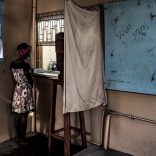Mozambique reports four more confirmed mpox cases
Mozambique: NGO denounces sexual abuse of displaced women and girls in exchange for aid, criticises silence

File photo: Lusa
The Centre for Public Integrity (CIP), a Mozambican NGO, has denounced in a report alleged sexual abuse of displaced women in Cabo Delgado, in the north of the country, in exchange for humanitarian aid, considering there was silence from the government and the United Nations on the matter.
“In all the houses we have entered, dozens and dozens, in many neighbourhoods, this issue has always been confirmed: in all of them, people knew about these kinds of cases,” the researcher Borges Nhamire, one of the co-authors of a report on displaced persons in the Cabo Delgado conflict, which was released on Monday, told Lusa.
[You may read the full CIP report “The number of internally displaced people in Mozambique has grown by about 2700% in two years”, in English, HERE]
The alleged abuses “are perpetrated by the local authorities who have the power to draw up the lists of the displaced people who should receive the aid.”, the document reads. ” In exchange for including the displaced on the lists of beneficiaries, the local leaderships demand sexual favours from vulnerable women and girls.”
The scenario was registered mainly in neighbourhoods of the provincial capital, Pemba; less frequently in Nampula province, and in most of the more organised IDP camps
According to Borges Nhamire, the complaints made by IDPs have not had any effect in punishing the perpetrators.
The CIP says that government organisations and United Nations agencies have rather rendered the subject “taboo”, instead of denouncing it in the light of day so that everyone is made aware of a “zero tolerance” for sexual abuse.
“The matter has been treated as highly taboo both by the government authorities and by the United Nations agencies who coordinate assistance to the displaced in Cabo Delgado. The women abuse has never been reported in the UN agencies reports about their work in Cabo Delgado, ” the CIP publication reads.
Borges Nhamirre told Lusa that the question was put to three United Nations organisations – the World Food Program (WFP), the International Organisation for Migration (IOM) and the United Nations High Commissioner for Refugees (UNHCR) – and none responded, “either on this subject or on others”, contrary to their usual practice.
“The three opted for silence. We sent emails and letters and made phone calls, but never got an answer. The matter is being treated as taboo,” he said.
If the topic is not dealt with openly, the authors “will think they can abuse women ‘in the dark’ and without risk, within a context of people “who do not know international law, nor the limits of what they can or cannot do”.
Nhamirre acknowledged that the context is not an easy one.
The authorities “allow NGOs to work as long as they do not tarnish the good image of the state or governmental institutions” and “raising this issue would call into question that same good image. Therefore, many people do not talk about it”.
However, “silence is never the best option, because the cost to people’s lives is very high”, especially for those who are already victims of armed conflict and who “should not be victims twice”.
Borges Nhamire considered it important for the government to do a basic job, pointing out that it is not very present in Cabo Delgado. According to the report: there are local authorities and volunteers, but they have no link with public administration.
Humanitarian agencies themselves have no authority to punish offenders, he added.
In addition to reports of sexual abuse, the CIP also reports complaints of misappropriation of humanitarian aid by local chiefs [“Theft of aid: “the first five on the list are the chiefs””].
Lusa tried to get reactions from the Mozambican National Institute for Disaster Management (INGC) and the United Nations in Mozambique to the CIP report, but in both cases, any eventual declarations were postponed to a later point in time.
The CIP’s report states that the number of IDPs in Mozambique has grown by 2,700% in two years, and that they currently represent 1.4% of the country’s population – 424,002 people out of a total population of 29 million.
The three-year armed conflict in Cabo Delgado is thought to have caused between 1,000 to 2,000 deaths. Since June 2019, some of the attacks have been claimed by the Islamic State jihadist group, but the real reasons behind the insurgency are still under debate.
The European Union (EU) said on Wednesday that it was “following closely” the wave of violence in Cabo Delgado, and that it would discuss what help it might make available in its next “political dialogue” with the Mozambican government.
My co-authored report on IDPs in #CaboDelgado is out.
Mozambican population is estimated at about 29 million, and around 424,000 (1.4%) are displaced.https://t.co/WOMzO0giqO
— Borges Nhamirre (@BorgesNhamirre) October 25, 2020












Leave a Reply
Be the First to Comment!
You must be logged in to post a comment.
You must be logged in to post a comment.